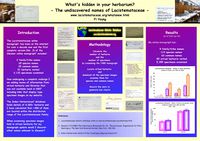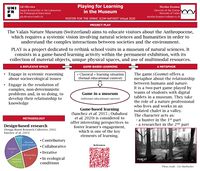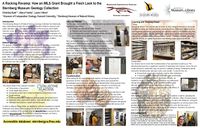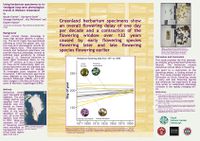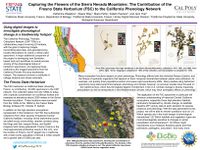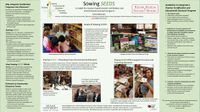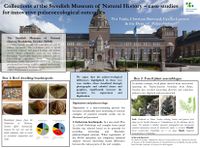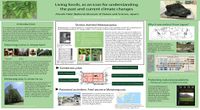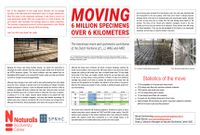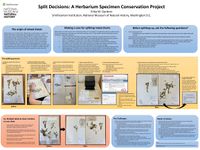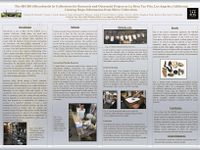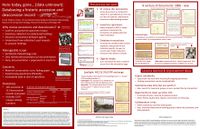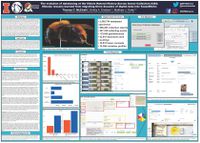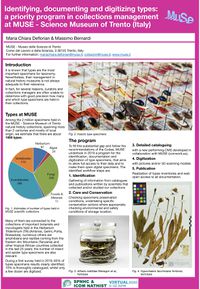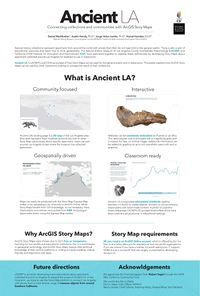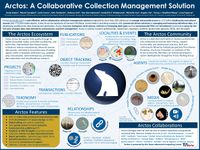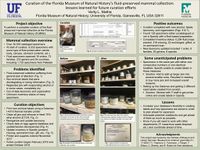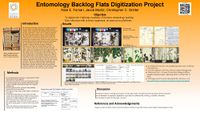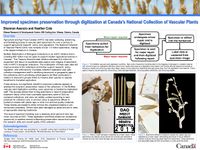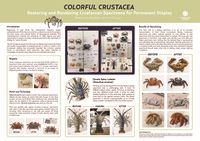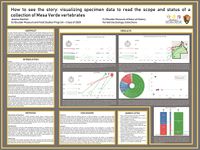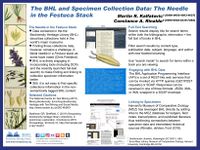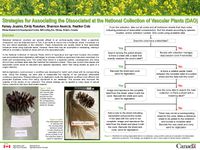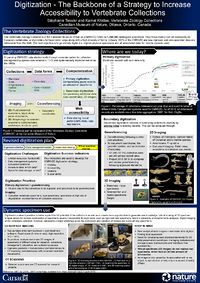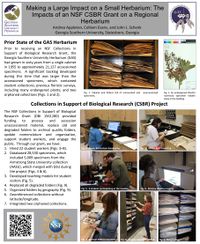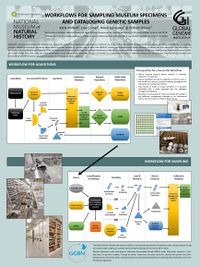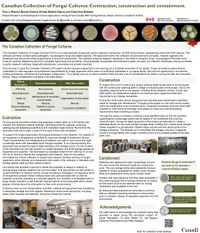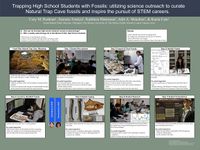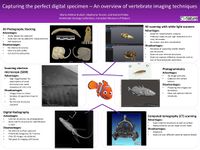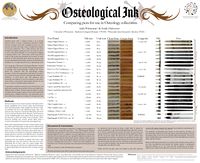Posters
Contents
Statement of Purpose
This page offers SPNHC members a permanent place to share and expand the reach of posters shared at SPNHC events such as our yearly conference. Otherwise, posters tend to be ephemeral. Poster content aggregates a LOT of intellectual capital. Let us all change community practice to give posters, people, and the content generated, a broader reach, and longer shelf life.
Realizing the import of collections and related materials [1][2][3], SPNHC recognizes the need to collaborate to develop, discover, disseminate and update best (better, current, recommended) practices for creating digital collections resources and publishing them for global access. Posters linked here represent the efforts of many collections worldwide. All in the collections and standards community are encouraged to contribute.
Poster Guidelines & Sharing
Interested in sharing a SPHNC poster presented at a past meeting? Best Practices committee members are soliciting copies of SPNHC posters from previous conference years to add to the SPNHC wiki. Authors should ensure that they have permissions to publicly share the images and information embedded in posters prior to publishing to the wiki.
In order to standardize content and maintain a web-friendly poster resolution, we ask that authors send digital copies of posters and relevant metadata to the Best Practices committee rather than upload directly to the wiki. Please provide the following information to Emily Braker:
- Conference year or venue (helpful for finding abstract)
- Author name(s) and affiliation(s)
- Keywords (up to 5)
- Poster formatted as a PDF, down-sampled to ~1500 pixel widths (if you are unfamiliar with resizing, a Best Practices member can do this for you). Full-resolution posters that are not down-sampled can very easily break the wiki since they can consume as much as 1GB memory to process.
- Optional: - email contact, ORCID ID, twitter handle (include only if you are willing share with wiki viewers).
Thank you to all poster contributors, and we encourage past SPNHC poster authors to consider sharing their work on the wiki so that it will continue to serve as a resource for others. Note that 2021 was a virtual conference year with no SPNHC poster submissions.
2020 Gallery
This table shares all posters as part of the SPNHC and ICOM NATHHIST Virtual 2020 Conference. Hover over images for poster keywords.
| What's hidden in your herbarium? The undiscovered names of the Lacistemataceae Fi Young Abstract |
Playing for Learning in the Museum: A Case for Understanding Human-Nature relationship through Game-Based Learning Gil Olivira, Nicolas Kramar Abstract |
A Rocking Revamp: How an IMLS Grant Brought a Fresh Look to the Sternberg Museum Geology Collection Christina Byrd, Alexa Franks, Laura Wilson Abstract |
Contraction of Flowering Phenology in Greenland Herbarium Specimens but not Field Observations Maude Grenier, Isla Myers-Smith, Gergaga Daskalova, Ally Phillimore, Elspeth Haston Abstract |
| Capturing the Flowers of the Sierra Nevada Mountains: The Contribution of the Fresno State Herbarium (FSC) to the California Phenology Network Katherine Waselkov, Reece Riley, Maria Peña, Katelin Pearson, Jenn Yost Abstract |
Sowing SEEDS: A model for museum-based teacher certification and environmental outreach programs Julia Robinson Abstract |
Collections at the Swedish Museum of Natural History - case studies for innovative palaeoecological outcomes Vivi Vajda , Christian Skovsted, Cecilia Larsson Abstract |
Living fossils, as an icon for understanding the past and current climate changes Atsushi Yabe Abstract |
| Moving 6 million specimens 6 kilometers: the monstrous move and systematics switcheroo of the Dutch Herbaria of L, U, WAG and AMD Marnel Scherrenberg, Roxali Bijmoer Abstract |
Split decisions. A herbarium specimen conservation project Erika Gardner Abstract |
The MICRO (Microfossils In Collections for Research and Outreach) Project at La Brea Tar Pits, Los Angeles, California- Gaining Mega Information from Micro Collections Christine Mazzello Abstract |
Here today, gone… [date unknown]: Databasing a historic accession and deaccession record Eva Biedron Abstract |
| The evolution of databasing at the INHS Insect Collection: lessons learned from migrating three decades of digital data into TaxonWorks Thomas C. McElrath Abstract |
Identifying, documenting and digitizing types: a priority program in collections management at MUSE - Science Museum of Trento (Italy) Maria Chiara Deflorian Abstract |
Ancient LA: Connecting collections and communities with ArcGIS Story Maps Daniel Markbreiter, Austin Hendy, Jorge Velez-Juarbe, Kamal Hamdan Abstract |
2019 Gallery
This gallery shares a selection of posters from the SPNHC 2019 Conference hosted in Chicago. Hover over images for poster keywords. Posters in this gallery are part of a retrocapture project and therefore not all posters presented at the 2019 meeting are represented below. Poster authors interested in sharing digital versions of posters from previous SPNHC meetings should contact Emily Braker.
| Arctos: A Collaborative Collection Management Solution Emily M. Braker, Mariel Campbell, Carla Cicero, John R. Demboski, Andrew Doll, Kyndall Hildebrandt, Michelle Koo, Angela Linn, Teresa J. Mayfield-Meyer, Carol Spencer |
Curation of the Florida Museum of Natural History’s Fluid-Preserved Mammal Collection: Lessons Learned for Future Curation Effort Verity Mathis |
Entomology Backlog Flats Digitization Project - California Academy of Sciences Alice E. Fornari, Christopher C. Grinter |
Improved Specimen Preservation through Digitization at Canada’s National Collection of Vascular Plants Shannon Asencio, Heather A. Cole |
| Crustacea: Restoring and Recoloring Crustacean Specimens for Permanent Display Madison Erin Mayfield, Alison Douglas |
How to See the Story: Visualizing Specimen Data to Read the Scope and Status of a Collection of Mesa Verde Vertebrates Jessica Mailhot |
BHL and Specimen Collection Data: The Needle in the Festuca Stack Martin R. Kalfatovic, Constance Rinaldo |
Strategies for Associating the Dissociated at the National Collection of Vascular Plants (DAO) Kelsey Joustra, Emily Ranahan, Shannon Asencio, Heather Cole |
| Digitization -The Backbone of a Strategy to Increase Accessibility to Vertebrate Collections Stéphanie Tessier, Kamal Khidas |
Making a Large Impact on a Small Herbarium: The Impacts of an NSF CSBR Grant on a Regional Herbarium Andrea Appleton, Colleen Evans, John J. Schenk |
Workflows for Sampling Museum Specimens and Cataloging Genetic Samples Katie F. Ahlfeld, Lisa M. Comer, Mark P. Lehtonen, William E. Moser |
Canadian Collection of Fungal Cultures: Contraction, Construction and Containment Tara L. Rintoul, Benoit Goulet, Zeinab Robleh Djama, Catherine Robidas |
| Trapping High School Students with Fossils: Utilizing Science Outreach to Curate Natural Trap Cave Fossils and Inspire the Pursuit of STEM Careers Cory M. Redman, Susumu Tomiya, Kathleen Bitterman, Julie Meachen, Kacia Cain |
Capturing the perfect digital specimen – An overview of vertebrate imaging techniques Marie-Hélène Hubert, Stéphanie Tessier, Kamal Khidas |
Unossified Skeletal Preparation: Challenges and Applications Andrea M. Carrillo, Julie M. Thomas, Jeff Stephenson, Michelle L. Sauther, Frank Cuozzo |
Osteological Ink: Comparing pens for use in Osteology Collections Jacki Whisenant, Emily Halverson |
Contributors
Current content contributors: SPNHC members Emily Braker, Deborah Paul. We hope that others will add their names to this list as information is added and updated.
References
- ↑ Lawrence M. Page, Bruce J. MacFadden, Jose A. Fortes, Pamela S. Soltis, Greg Riccardi, Digitization of Biodiversity Collections Reveals Biggest Data on Biodiversity, BioScience, Volume 65, Issue 9, 01 September 2015, Pages 841–842, https://doi.org/10.1093/biosci/biv104
- ↑ Nelson, G., & Ellis, S. (2019, January 7). The history and impact of digitization and digital data mobilization on biodiversity research. Philosophical Transactions of the Royal Society B: Biological Sciences. Royal Society Publishing. https://doi.org/10.1098/rstb.2017.0391
- ↑ Monfils, A. K., Powers, K. E., Marshall, C. J., Martine, C. T., Smith, J. F., & Prather, L. A. (2017). Natural History Collections: Teaching about Biodiversity Across Time, Space, and Digital Platforms. Southeastern Naturalist, 16(sp10), 47–57. https://doi.org/10.1656/058.016.0sp1008
